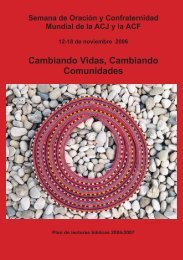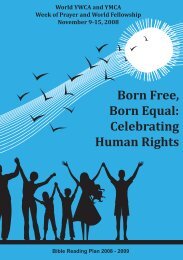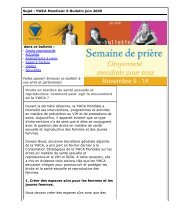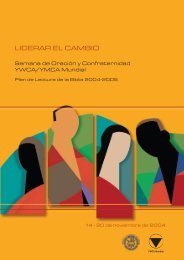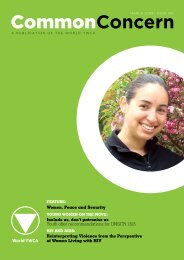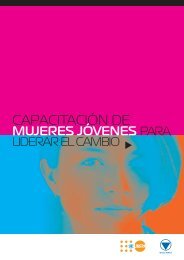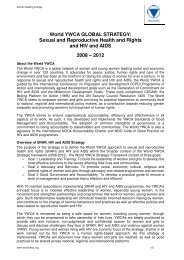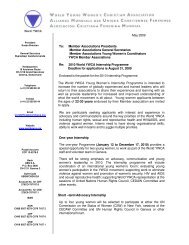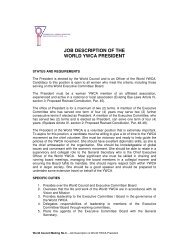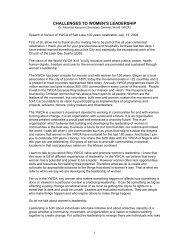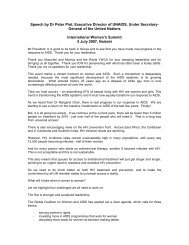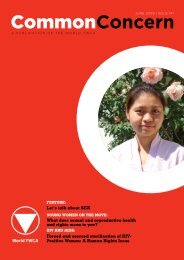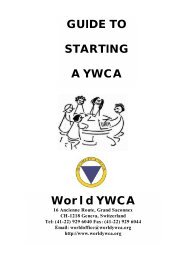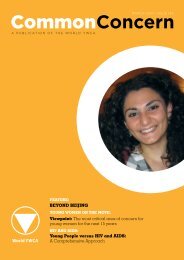If I kept it to myself - World YWCA
If I kept it to myself - World YWCA
If I kept it to myself - World YWCA
You also want an ePaper? Increase the reach of your titles
YUMPU automatically turns print PDFs into web optimized ePapers that Google loves.
Young women intervene in a world w<strong>it</strong>h AIDS<br />
and management for professionals like nurses,<br />
teachers, police and army personnel. They offer<br />
lunchtime training, support groups for members,<br />
pre and post counselling w<strong>it</strong>h HIV testing,<br />
therapy, workshops, home vis<strong>it</strong>s, and orphan<br />
support through family counselling. I learnt a lot<br />
while at Connect, and use the skills I learnt on a<br />
daily basis.<br />
I am now a facil<strong>it</strong>a<strong>to</strong>r w<strong>it</strong>h the International Video<br />
Fair (IVF), which is an organisation whose aim<br />
is <strong>to</strong> educate commun<strong>it</strong>ies on crucial social<br />
development issues through the use of video <strong>to</strong><br />
audiences w<strong>it</strong>hout access <strong>to</strong> mainstream media.<br />
IVF’s education focus is mainly centred on HIV<br />
and AIDS, teenage sex and pregnancy, nutr<strong>it</strong>ion,<br />
gender issues and on women who have taken up<br />
the challenge of changing their lives and those of<br />
the people in commun<strong>it</strong>ies around them.<br />
There are still a lot of misconceptions about<br />
HIV and AIDS and other issues surrounding <strong>it</strong>.<br />
I find that people feel free <strong>to</strong> talk about HIV and<br />
AIDS issues w<strong>it</strong>h someone who has experience<br />
w<strong>it</strong>h the virus. As an IVF film screening<br />
facil<strong>it</strong>a<strong>to</strong>r, I have observed that the programme<br />
has helped both those who have access <strong>to</strong><br />
mainstream media and those who don’t. In<br />
2003, IVF partnered w<strong>it</strong>h STEPS <strong>to</strong> screen a<br />
series of short films about HIV and AIDS across<br />
Zimbabwe. The campaign lasted ten months<br />
w<strong>it</strong>h repeat shows in some commun<strong>it</strong>ies. I<br />
participated as a discussion facil<strong>it</strong>a<strong>to</strong>r, mobiliser,<br />
activist, peer educa<strong>to</strong>r, social worker and<br />
actress. For ten months we discussed issues<br />
around HIV and AIDS and I gave my testimony<br />
of living pos<strong>it</strong>ively w<strong>it</strong>h HIV <strong>to</strong> audiences around<br />
Zimbabwe, reaching an average of 3,500 people<br />
per show w<strong>it</strong>h 22 shows per month. Throughout<br />
Zimbabwe I travelled <strong>to</strong> commun<strong>it</strong>ies and public<br />
gatherings giving my testimony before and after<br />
video screenings. Many young women or girls<br />
interested in more information would approach<br />
me after the show and I was more than willing<br />
<strong>to</strong> listen, discuss and provide l<strong>it</strong>erature. When<br />
we returned <strong>to</strong> some commun<strong>it</strong>ies for repeat<br />
screenings I noticed that the question and<br />
answer session was very different, the level of<br />
questions showed more matur<strong>it</strong>y and signs of<br />
understanding.<br />
As I look back at the shows we did here in<br />
Zimbabwe, I always learnt something new and<br />
this made the ten-month campaign interesting<br />
and very educational. The unique thing between<br />
the audience and me is that we all gained<br />
knowledge both from each other and from the<br />
films. As we moved from place <strong>to</strong> place we<br />
learned about different cultural and religious<br />
beliefs that contribute <strong>to</strong> the spread of HIV and<br />
AIDS. Having these discussions made me realise<br />
that there are still some Zimbabweans in denial.<br />
People do not want <strong>to</strong> accept that HIV really<br />
exists until <strong>it</strong> comes knocking on their door. Some<br />
even say that people are using <strong>it</strong> as a way of<br />
making money.<br />
One of the main issues raised is that people find<br />
<strong>it</strong> difficult <strong>to</strong> talk about HIV in their households<br />
because of cultural or religious beliefs. The same<br />
s<strong>it</strong>uation happened in the audience, especially<br />
w<strong>it</strong>h the children; they lim<strong>it</strong>ed their views because<br />
of adults. I think children had a lot more <strong>to</strong> say<br />
but they could not open up because of the mixed<br />
audience. As a result of seeing these films and<br />
having these discussions, I believe most people<br />
have accepted that HIV really exists. People do<br />
not want <strong>to</strong> change their sexual behaviour desp<strong>it</strong>e<br />
65



